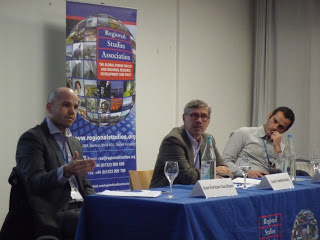The 2012 Regional Studies Association Early Career Conference took place on 1st and 2nd November at Hafen City University in Hamburg. The conference under the title of Times of Change: Future Directions in Geography, Urban and Regional Studies examined the implications of the current economic and financial crisis for future of regional studies. Individual sessions covered a wide range of specific topics including finance, innovation, place branding, resilience and sustainability, territorial inequalities and regional governance.

Enrique Garcilazo (OECD) , Costis Hadjimichalis and Pedro Marques, Final Plenary Session, RSA Early Career Conference, Hamburg 2nd November 2012.
The conference ended with a provocative final keynote address from Professor Costis Hadjimichalis (Harokopio University, Athens) who argued for the need to evaluate the contemporary crisis from the perspective of urban and regional studies. He highlighted in particular the underlying geography of spatially uneven capitalist development at the root of the current economic and financial crisis in Europe. His contribution challenged the conference participants to re-examine the politics of mainstream neoliberal economic theory and its spatial implications. He suggested that we need to ask ourselves if we are satisfied with uneven development and social and spatial injustice.
Prof. Hadjmichalis further claimed that there is an evident crisis of regional economic theory, as many of the models of the pre-crisis period have been found to be wanting. Significantly, however, he argues that there has been a notable silence from the proponents of such models and
as yet, the required re-evaluation and critical re-appraisal has still to occur. For the author of this blog post, his talk provided a very important reminder of the need to constantly critically reflect on the silences within our research and the need to address critical questions of uneven development and social and spatial injustice. His talk was in part based on a recent paper published in European Urban and Regional Studies.
The Early Career Conference was attended by 60 early career researchers (mostly PhD students) from 18 countries. Together with the journal Regional Insights and Early Career Grant Scheme, the early career conference is a key element of the RSA’s strategy to support researchers in the early stages of their careers. Indeed we hope to see papers based on some of the conference presentations in future issues of Regional Insights. The conference was organised by Dr. Tim Heinemann of HafenCity University, Hamburg and Dr. Pedro Marques of Kiel University.